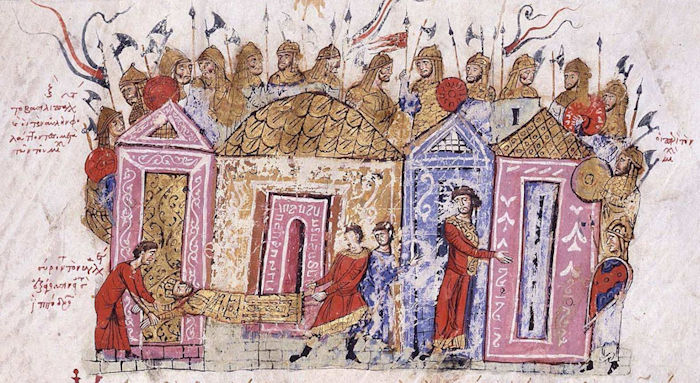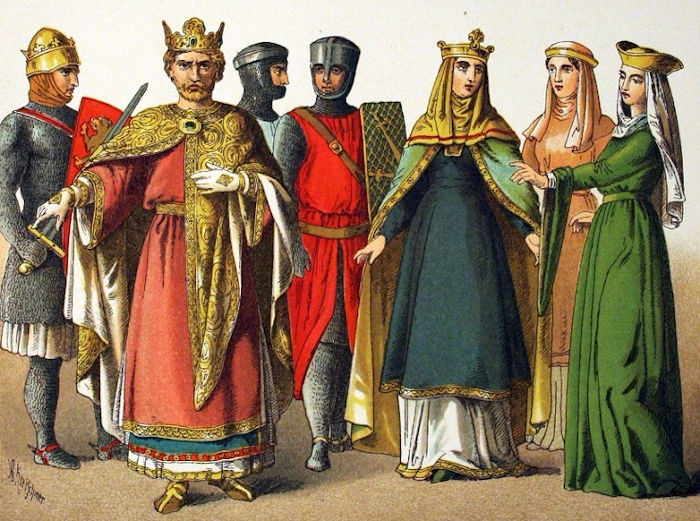Nova Anglia: The Anglo-Saxon New England In The East
Zteve T Evans - AncientPages.com - Nova Anglia, or New England, was alleged to have been a community of exiled Anglo-Saxon nobles and warriors who intended it to be their new homeland after being defeated by King William I, the Norman conqueror of England. This community was believed to have been situated in the Black Sea region, possibly Crimea, and established sometime after 1075 and lasted up to the 13th century.
Varangian Guardsmen, an illumination from the Skylitzes Chronicle; many if not most members of the Varangian guard were English after the 11th century. Credit: Public Domain
Not all historians agree it existed or where it was situated and for every expert with a theory there is another with a counter theory. Nevertheless, it is well known that Anglo-Saxons from England had a strong presence in the elite Varangian Guard of the Byzantine emperors who were said to have granted the exiled English permission to create a new homeland for themselves or at least encouraged it.
After William conquered England he had hoped to placate and control the English earls by allowing them to keep part of their lands and status. Nevertheless, after they rebelled in 1069, he confiscated land and status giving them to his Norman barons. After a second rebellion in 1075, he left very few English earls with any power or status. With the failure of the uprisings any hope the rebels retained of driving the Normans from England evaporated. However, a bitter hardcore of disaffected earls and warriors remained who were unwilling to live under a Norman rule and went into exile in search of a new home abroad where they could build a Nova Anglia, a New England, to their liking.
Anglo-Saxon Exodus
The English had heard about the glories of the Byzantine Empire. Constantinople may have seemed remote and romantic but it was a place for men of action to rebuild their fortunes with their swords and axes. A legend recorded in two medieval texts the Chronicon Universale Anonymi Laudunensis, from the 13th century France and the 14th century, Játvarðar Saga from Iceland tell their story. The Játvarðar Saga tells of an exodus of Anglo-Saxons warriors from England to Constantinople, and beyond. Led by Siward, earl of Gloucester, with three earls and eight barons, and a host of English warriors in a fleet of 350 ships left England in search of a new home abroad.
The fleet sailed down the coast of Iberia and through the Straights of Gibraltar into the Mediterranean Sea. They attacked and took Ceuta on the North African coast capturing significant amounts of gold and silver. They sailed on to capture Majorca, followed by Menorca, and moved on to Sicily where they heard that enemies besieged Constantinople. From Sicily they sailed to Constantinople arriving in time to break the siege and drive off the attackers.
Emperor Alexios I
In gratitude for their help, and impressed by their fighting skills, the Emperor Alexios I sought to recruit them into to his Varangian Guard, an elite company of foreign warriors mostly, Scandinavians. They were formed when the emperor Basil II requested military aid from Kievan Rus, a medieval state dominated by the city of Kiev and located where Belarus, Ukraine, and parts of Russia exist today.
A substantial army was sent which proved a formidable military force and later became the personal bodyguard of the emperor, famed for their loyalty, fighting skills and ferocity. An invitation to join these would have been regarded as a great honor and privilege. Although many accepted and joined, Siward and others still sought a new homeland. The grateful emperor told them of a land north-east of the Black Sea that had once been part of his empire and gave them his blessing to conquer for themselves if they could.
New England
Those intent of winning a new homeland succeeded naming it Nova Anglia, or New England. They gave familiar English name to their towns and cities including names such as New London and New York. For religion they sent to Hungary for their Roman cleric rejecting the Norman interpretation of Orthodox Christianity.
Normans by Albert Kretschmer, painters and costumer to the Royal Court Theatre, Berin, and Dr. Carl Rohrbach. - Costumes of All Nations (1882). Credit: Public Domain
Despite their success, the remaining English fighters still yearned to return home and reclaim England from the Normans. Nevertheless, they did settle down and rebuild their lives and impressed with their fighting skills and were often very well rewarded. The emperor allowed one high-ranking Englishman from Canterbury to marry a woman from a rich and high-ranking family and given the equivalent of a dukedom. In thanks to Constantinople, he built a church dedicated to Saint Nicholas and Saint Augustine which became the chapel of choice for English members of the Varangian Guard.
Word of the success and respect these expatriates received eventually travelled back to England to the ears of other young English noblemen who went in search of their own fortunes to Byzantine.
The Historia Ecclesiastica
A further source for the English presence in Constantinople comes from The Historia Ecclesiastica by Orderic Vitalis and English chronicler and Benedictine monk. His work is highly rated as the best English social history of the Middle Ages. He writes,
“Others went into voluntary exile so that they might either find in banishment freedom from the power of the Normans or secure foreign help and come back and fight a war of vengeance. Some of them who were still in the flower of their youth travelled into remote lands and bravely offered their arms to Alexius, emperor of Constantinople, a man of great wisdom and nobility. Robert Guiscard, duke of Apulia, had taken up arms against him in support of Michael whom the Greeks—resenting the power of the Senate—had driven from the imperial throne.
Guests from Overseas by Nicholas Roerich (1899)
Consequently, the English exiles were warmly welcomed by the Greeks and were sent into battle against the Norman forces, which were too powerful for the Greeks alone. The Emperor Alexius laid the foundations of a town called Civitot for the English, some distance from Byzantium; but later when the Norman threat became too great he brought them back to the imperial city and set them to guard his chief palace and royal treasures.
This is the reason for the exodus of the English Saxons to Ionia; the emigrants and their heirs faithfully served the holy empire, and are still honoured among the Greeks by the Emperor, nobility, and people alike.” (1)
From what Orderic says, the emperor valued the fighting prowess of Anglo-Saxons against their old enemies the Norman even laying the foundation of a town called Civitot for them to dwell in. He trusted them enough to recall them to guard his palace and treasure house.
The Battle Of Beroe
During the Battle of Beroe in 1122, the invading Pechenegs military tactics revolved around the use of a laager, which could be a circle of fortified wagons, or one massive, fortified wagon which supported fast horsemen firing continuous streams of arrows. The laager was a depot to supply the horsemen with arrows, a rallying point, and a place of last defense and exceedingly difficult to overcome. Eventually, the Byzantine army forced the Peschenegs to retreat to their laager which they defended ferociously. The Byzantine Emperor John II Komnenos led the Varangian Guard armed with their great axes against the Pecheneg defense and they cut their way through to give him the victory.
This work explores legends of towns, cities, islands and lands lost to the sea or buried by sand or snow. Along with the legend of the loss very often comes a myth of origin of a feature of the landscape, such as a lake, massive dune or ocean reef. As well as exploring mythical and legendary examples we look at real towns and places in history that were disastrously wiped out. In many cases we find there is a simple but powerful message that our behaviour is constantly monitored and judged. Any transgression of God's laws will not go unnoticed by the all-seeing eye. We will be judged and punished accordingly in a time and manner that suits the divine will. Vengeance will come! Read more
From the wreckage of England after the Norman Conquest, the disenfranchised English, in reward for their fighting prowess and bravery, received permission from the emperor to carve out their own realm and receive an honored place in his elite Varangian Guard. Although the majority Guard had initially consisted of Scandinavians from the later part of the eleventh century there was a substantial involvement of English warriors who made up a high proportion of the Varangian guard up to 1204 and the siege of Constantinople.
Written by Zteve T Evans - AncientPages.com
Expand for references
REFERENCES, ATTRIBUTIONS AND FURTHER READING
New England and the Anglo-Saxons in Roman Empire - Total War Center
The Medieval New England - An Anglo-Saxon Colony on The Black Sea
Another New England - in Crimea
The medieval 'New England': a forgotten Anglo-Saxon colony on the north-eastern Black Sea coast
(1) The Ecclesiastical History of Orderic Vitalis: Volume II: Books III & IV: Volume 2: Books III and IV (Oxford Medieval Texts) Paperback – Illustrated, 29 Nov. 1990 by Marjorie Chibnall
Zteve T Evans - enjoys researching deep into the folklore, myths and legends that run through society and are part of our everyday lives and has written extensively for the #FolkloreThursday website He always finds it a source of fascination discovering and learning how our ancestors perceived the times they lived in and how they have influenced us today. Zteve believes that people have far more in common with each other than is often shown on the surface and this can often be seen in the folktales from other parts of the world. Zteve has two websites dedicated to myths, legends, and folklore from around the world. These are Under the influence! and Folkrealm Studies. He has also contributed to Enchanted Conversation Magazine. and runs Tellurian Studies, a site dedicated to issues concerning the environment, geology, ecology, biology, archaeology and any other branch of science that effects the planet and its inhabitants.
Copyright © Zteve T Evans - AncientPages.com All rights reserved. This material may not be published, broadcast, rewritten or redistributed in whole or part without the express written permission of Zteve T Evans and AncientPages.com
More From Ancient Pages
-
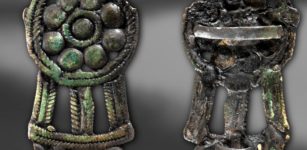 Hunter-Gatherer Metallurgy In The Early Iron Age Of Northern Fennoscandia Was Integrated And Advanced
Archaeology | Aug 15, 2023
Hunter-Gatherer Metallurgy In The Early Iron Age Of Northern Fennoscandia Was Integrated And Advanced
Archaeology | Aug 15, 2023 -
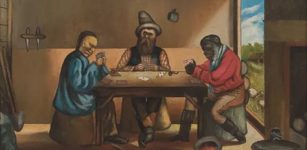 How Gold Rushes Helped Make The Modern World
Featured Stories | Aug 1, 2019
How Gold Rushes Helped Make The Modern World
Featured Stories | Aug 1, 2019 -
 Sonar Images Reveal The Existence Of A 700-Year-Old Shipwreck At The Bottom Of Lake Mjøsa, Norway
Archaeology | Nov 22, 2022
Sonar Images Reveal The Existence Of A 700-Year-Old Shipwreck At The Bottom Of Lake Mjøsa, Norway
Archaeology | Nov 22, 2022 -
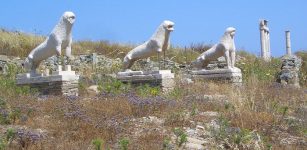 Mystery Of The Marble Lions On The Sacred Island Of Delos Solved?
Archaeology | Oct 12, 2021
Mystery Of The Marble Lions On The Sacred Island Of Delos Solved?
Archaeology | Oct 12, 2021 -
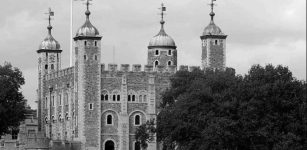 On This Day In History: Simon Fraser – The Last Man In Britain To Be Executed On Tower Green, London – On Apr 9, 1747
News | Apr 9, 2017
On This Day In History: Simon Fraser – The Last Man In Britain To Be Executed On Tower Green, London – On Apr 9, 1747
News | Apr 9, 2017 -
 Humans Carry DNA From An Ancient, Unidentified Ancestor – Scientists Say
DNA | Apr 13, 2023
Humans Carry DNA From An Ancient, Unidentified Ancestor – Scientists Say
DNA | Apr 13, 2023 -
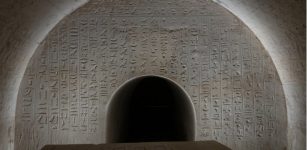 Magnificent Decorated Tomb Of Scribe Unearthed At Abusir Sheds New Light On Ancient Egyptian History
Archaeology | Nov 8, 2023
Magnificent Decorated Tomb Of Scribe Unearthed At Abusir Sheds New Light On Ancient Egyptian History
Archaeology | Nov 8, 2023 -
 On This Day In History: Henry IV Is Crowned King Of France – On Feb 27, 1595
News | Feb 27, 2017
On This Day In History: Henry IV Is Crowned King Of France – On Feb 27, 1595
News | Feb 27, 2017 -
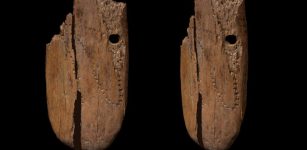 41,500-Year-Old Ivory Pendant Is The Oldest Evidence Of Humans Decorating Jewelery In Eurasia
Archaeology | Nov 26, 2021
41,500-Year-Old Ivory Pendant Is The Oldest Evidence Of Humans Decorating Jewelery In Eurasia
Archaeology | Nov 26, 2021 -
 ‘Yunatsite’ And Thought-Provoking Theory That Balkan Peninsula And Not Mesopotamia Was The Cradle Of Civilization
Featured Stories | Feb 14, 2023
‘Yunatsite’ And Thought-Provoking Theory That Balkan Peninsula And Not Mesopotamia Was The Cradle Of Civilization
Featured Stories | Feb 14, 2023 -
 Bizarre Sound Of A Crash Remains An Unexplained Mystery
Featured Stories | Oct 22, 2020
Bizarre Sound Of A Crash Remains An Unexplained Mystery
Featured Stories | Oct 22, 2020 -
 Well-Preserved Fragments Of Epetion’s Wall Discovered At The Hellenistic Site Of Stobreč, Near Split, Croatia
Archaeology | Oct 11, 2024
Well-Preserved Fragments Of Epetion’s Wall Discovered At The Hellenistic Site Of Stobreč, Near Split, Croatia
Archaeology | Oct 11, 2024 -
 Mystery Of The Giants’ Grave of Coddu Vecchiu
Featured Stories | Jun 27, 2015
Mystery Of The Giants’ Grave of Coddu Vecchiu
Featured Stories | Jun 27, 2015 -
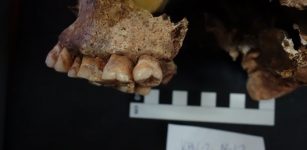 Milk Enabled Massive Steppe Migration
Archaeology | Sep 15, 2021
Milk Enabled Massive Steppe Migration
Archaeology | Sep 15, 2021 -
 Evidence Of The Biggest Ever Solar Storm 14,300 Years Ago – Found In Ancient Tree Rings
Earth Changes | Oct 9, 2023
Evidence Of The Biggest Ever Solar Storm 14,300 Years Ago – Found In Ancient Tree Rings
Earth Changes | Oct 9, 2023 -
 Dozens Of Unique 2,500-Year-Old Ceremonial Treasures Discovered In A Drained Peat Bog
Archaeology | Jan 27, 2023
Dozens Of Unique 2,500-Year-Old Ceremonial Treasures Discovered In A Drained Peat Bog
Archaeology | Jan 27, 2023 -
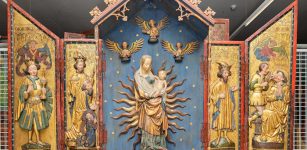 Secrets Of Nanomaterial From The Middle Ages Examined By Scientists
Archaeology | Oct 11, 2022
Secrets Of Nanomaterial From The Middle Ages Examined By Scientists
Archaeology | Oct 11, 2022 -
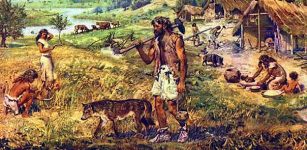 DNA Study Reveals How Europe’s Hunter-Gatherers Adapted To A New Way Of Life – Farming
Archaeology | Nov 24, 2015
DNA Study Reveals How Europe’s Hunter-Gatherers Adapted To A New Way Of Life – Farming
Archaeology | Nov 24, 2015 -
 Spectacular Fengdu Ghost City Devoted To Afterlife
Chinese Mythology | Aug 22, 2016
Spectacular Fengdu Ghost City Devoted To Afterlife
Chinese Mythology | Aug 22, 2016 -
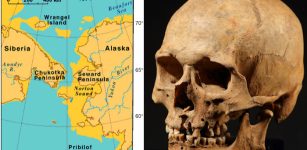 Ancient DNA Reveals Migration From North America Across The Bering Sea And Unknown Prehistoric People In Siberia
Archaeology | Jan 12, 2023
Ancient DNA Reveals Migration From North America Across The Bering Sea And Unknown Prehistoric People In Siberia
Archaeology | Jan 12, 2023

